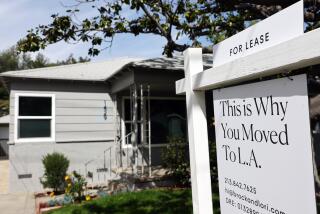Guidelines can help make renting out a room a livable situation
- Share via
Incline Village, Nev. — Renting out a room in his home was both a financial necessity for Christopher Paulsen and a hedge against loneliness.
“It was like empty nest syndrome, and I thought I could use a few bucks to offset costs,” said Paulsen, 48, whose youngest son left home here last year.
Paulsen placed an ad on Craigslist and got many responses. He chose an AmeriCorps volunteer to take over the room for a year in his two-bedroom town home in this small town at Lake Tahoe.
“I don’t want to raise kids over again, but this means I have someone around the house and helps pay the bills,” Paulsen said.
He is one of many homeowners in a down economy who are making extra income by renting out rooms in their homes.
“Right now people are trying to stay in their home for the long term and may need a roommate to make that happen,” said Eva Rosenberg, founder of the tax-advice website TaxMama.com and author of “Small Business Taxes Made Easy.”
But becoming both roommate and landlord can be tricky. You need to find someone you can live with as well as someone dependable and financially responsible. You also need to be aware of fair housing and tax rules, experts say.
Checking a potential housemate’s credentials and credit history is crucial, said Leigh Robinson, author of “Landlording.” Double-check the person’s credit, employment and former housing situation, he said.
“Too many people who rent a room out in their house are too trusting, and they need to make sure they are following good procedures,” he said. “You need to know as much about them as you possibly can.”
Robinson advises meeting in person and even seeing where the prospective housemate lives.
“The way they are living now is the same way they are going to be living in your dwelling,” he said. “It’s more like a marriage than renting to someone who is going to be living in another dwelling you may own.”
The next step is to draw up a lease and a list of house rules. Although the lease can be succinct, house rules should be specific and signed by the roommate, Robinson said. Items to consider include pets, smoking, guests, use of amenities, cooking, maintenance and cleaning.
For examples of leases and forms, Robinson recommended www.mrlandlord.com.
Homeowners also should check local laws and any community rules regarding renters before drawing up a lease, said Stephen Fainsbert, a Los Angeles real estate lawyer.
Leases can be difficult to revoke, he warned -- all the more reason to research a prospective roommate carefully.
“It could be very difficult to get them out, and it may be an uncomfortable situation where you are bringing a lawsuit against them and living in confined borders,” Fainsbert said.
Although homeowners may believe they can rent rooms to whomever they want, they must comply with local, state and federal fair housing laws, which are meant to prevent discrimination, said John Trasvina, assistant secretary for the U.S. Department of Housing and Urban Development’s Fair Housing and Equal Opportunity office.
“Once you decide to rent out your own home, you trigger provisions of the Fair Housing Act,” Trasvina said.
The act does not allow landlords to refuse to rent to someone based on race, color, national origin, religion, sex, familial status or handicap, although exceptions can be made for sex in the case of a landlord/roommate arrangement.
“There is a general recognition of the right to privacy,” Trasvina said. “We would respect a decision like a woman wanting to rent out a room to another woman.”
Trasvina recommends that in advertising, the homeowner focus more on the property than on the qualities of the desired tenant.
Before taking on a tenant, speak with a tax professional about details.
“It will save you so much time and so much money,” Rosenberg said.
Homeowners can rent out their home for as many as 14 days a year tax-free, Rosenberg said.
“If you just want some quick, tax-free money with a special event going on in your town, this is something to consider,” she said.
But for a more long-term situation, a clearly defined lease can help reap the tax benefits of renting out extra space, she said.
Although homeowners must declare the rent payments they receive as rental income, they also may be able to deduct part of property costs such as utilities, maintenance and fees, depending on what percentage of the home they rent.
More to Read
Sign up for Essential California
The most important California stories and recommendations in your inbox every morning.
You may occasionally receive promotional content from the Los Angeles Times.






